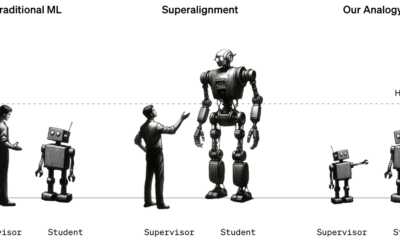Politics
5 Benefits Engineers Can Bring to a Tech Hiring Team
Published
1 year agoon
By
Drew Simpson
The tech job market is in a perpetual state of flux. One day, there’s news of talent shortages; the next, rampant layoffs. But one thing remains constant: there will always be a need for skilled tech workers. Whether the market is booming or a recession looms, positions for highly skilled tech professionals can sit unfilled for months, while employers struggle to find the right candidates to stay on top of the game. To win, every company needs an airtight strategy for attracting the best possible talent.
Some companies are handling today’s tech hiring challenges by turning to recruiters with more specialized knowledge, such as backgrounds in engineering. Startups and established enterprises alike may benefit from including engineers at the hiring table or handing over their recruiting processes to highly experienced tech professionals. Dedicated experts — rather than more generalized recruiters — can help companies create leaner, more efficient tech hiring processes.
Here are some reasons engineers and other tech experts can help save companies time and money, while ensuring they find the best candidates for each role.
1. They Speak the Candidates’ Language
In a 2022 report on tech hiring, the New York Times points out that traditional recruiters can scare tech candidates off with too much friendliness and fluff. They forget that their data-oriented audience may just want the hard facts about the job. Engineers in recruiting roles know that a quick message highlighting the most important bullet points of the role will often go much further in attracting a left-brained candidate than a lengthy personal introduction penned by a more conventionally personable recruiter.
Furthermore, tech talent may find that encounters with standard recruiters feel like a game of telephone. A current member of the team explains the ins and outs of the role to a recruiter, who must then convey that information to a potential candidate. But when recruiters possess only general industry knowledge, a lot can get lost in translation.
Recruiters may not understand enough about the role to accurately relay the information or answer candidates’ questions about the inner workings of the position. This can lead to a frustrating experience for the candidate and a whole lot of back-and-forth for the company and the recruiter. With experienced engineers at the recruiting helm, candidates waste less time waiting for answers to more detailed or technical questions about the job, and current employees exhaust fewer resources prepping recruiters for candidate interviews.
2. They Know What Tech Professionals Are Looking For
In today’s world, highly skilled tech talent will leave any job that doesn’t work for them, so employers need to understand how to best appeal to candidates. Hint: It’s not just a salary and benefits package.
An experienced engineer in a recruiting role can help identify the things that really matter to today’s tech professionals, like a flexible or asynchronous work schedule, work-from-anywhere options, and the right mentorship and learning opportunities. Engineers can assist companies in developing a comprehensive and effective employee value proposition: the right combination of role composition and employee benefits to attract the perfect talent for the job.
As this suggests, it’s not all about perks. Most tech professionals want to feel truly engaged by their jobs — they want to enter that state of flow, where their work is equally challenging and meaningful. They want to feel a sense of connection and purpose on the job. When engineers work as recruiters, they can empathize with candidates’ need to really sink their teeth into a project and help match them with a role they’re excited to wake up for each morning.
3. They Know What Employers Are — And Will Be — Looking For
Just as engineers know what their fellow tech professionals are seeking in a job, they know what hard and soft skills employers require to achieve business results. They understand the state of the market and know what languages, platforms, and tools applicants must have mastered to ensure project success. Better yet, they have the tech chops to assess that mastery.
While most tech employers understand by now that resumes often take a backseat to skills assessments during the hiring process, there’s still a science to choosing the best evaluations for the job. Engineers can help employers avoid generic coding tests and select or design skills assessments that are more closely tailored to the specifics of the role.
Engineers on a hiring team can also help determine what skills and expertise may be needed to take an established company into the future or bring an exciting new product to market. They can predict which candidates will be best equipped to train for these skills later and stock their contact lists with people who might be a fit in months or years to come, even if they aren’t the best candidates now.
4. They Bring Greater Efficiency to the Hiring Process
According to tech talent acquisition agency OSI Engineering, engineers are much more effective than the average recruiter at recognizing the kinds of hard and soft skills that make a candidate right for a specific role. With a quick scan of a resume or a few glances at a LinkedIn page, they can more quickly spot applicants that are up to the task.
Without that same highly specialized experience and technical know-how, generalist recruiters need to work harder — and longer — to source and select the right people to interview. That’s a problem, as one of the main flaws in the tech hiring process today is the lag time between first contact with a candidate and actually making an offer. In many cases, this can take up to several months.
In the time it takes to move through the hiring process, a company’s ideal candidate may already have accepted another offer or even started a new position. When decision-makers have more experience with the roles being offered, they can streamline hiring timelines, making companies less likely to lose out on the right candidate.
5. They Can Help Companies Avoid Costly Hiring Mistakes
Engineers can play an equally important role in weeding out the wrong candidates. Google, for example, uses a structured interviewing process developed by its People Analytics Team to forestall toxic hires.
The reason that’s so vital is that bad hiring choices cause about 80% of employee turnover, which in turn contributes to recruiting and hiring cycles that cost U.S. businesses $72 billion a year. Recruiters with engineering or other technical expertise can help stop these bad hires from happening in the first place, saving companies a fortune on firing and rehiring.
As vital as it is to stop the wrong hire before it happens, however, rejections need to be handled with care. Recruiters without a technical background may struggle to give detailed, accurate feedback to a candidate on why they weren’t chosen for the job. Fortunately, engineers have no such difficulty.
Because engineers can effectively relay this information to the candidate, that individual is more likely to walk away from the interview with a better understanding of where they need to learn and grow. More importantly, this candid but constructive feedback creates a positive experience of the employer and the brand, which other tech professionals in the candidate’s network are sure to hear about.
Go With the Pros
So when you’re looking to hire tech employees, there are five good reasons to leave it in the hands of engineers. Here’s one more.
Engineers have established networks, often including fellow professionals in the global, virtual space. With more tech workers wanting to work remotely, a shortage of skilled tech workers in the U.S., and an increasingly global talent marketplace, companies can’t just rely on their local networks to find applicants. They need recruiters with contacts around the world who are familiar with niche job boards and other places attractive candidates might be hiding out. Engineers fit this bill, too.
When you leverage engineers in your tech recruiting process, you up your chances of landing skilled hires that can help your company achieve its business goals. And if you likewise tap the international talent pool, you can make not just qualified but more diverse hires, improving company culture, productivity, and reputation.
Featured Image Credit: by Edmond Dantès; Pexels; Thanks!
Brad Anderson
Editor In Chief at ReadWrite
Brad is the editor overseeing contributed content at ReadWrite.com. He previously worked as an editor at PayPal and Crunchbase. You can reach him at brad at readwrite.com.
You may like
-


Now we know what OpenAI’s superalignment team has been up to
-


Yahoo’s decades-long China controversy and the responsibility of tech companies
-


Chinese apps are letting public juries settle customer disputes
-


Make no mistake—AI is owned by Big Tech
-


Climate tech is back—and this time, it can’t afford to fail
-


Your guide to talking about climate tech over the holidays
Politics
Fintech Kennek raises $12.5M seed round to digitize lending
Published
7 months agoon
10/11/2023By
Drew Simpson
London-based fintech startup Kennek has raised $12.5 million in seed funding to expand its lending operating system.
According to an Oct. 10 tech.eu report, the round was led by HV Capital and included participation from Dutch Founders Fund, AlbionVC, FFVC, Plug & Play Ventures, and Syndicate One. Kennek offers software-as-a-service tools to help non-bank lenders streamline their operations using open banking, open finance, and payments.
The platform aims to automate time-consuming manual tasks and consolidate fragmented data to simplify lending. Xavier De Pauw, founder of Kennek said:
“Until kennek, lenders had to devote countless hours to menial operational tasks and deal with jumbled and hard-coded data – which makes every other part of lending a headache. As former lenders ourselves, we lived and breathed these frustrations, and built kennek to make them a thing of the past.”
The company said the latest funding round was oversubscribed and closed quickly despite the challenging fundraising environment. The new capital will be used to expand Kennek’s engineering team and strengthen its market position in the UK while exploring expansion into other European markets. Barbod Namini, Partner at lead investor HV Capital, commented on the investment:
“Kennek has developed an ambitious and genuinely unique proposition which we think can be the foundation of the entire alternative lending space. […] It is a complicated market and a solution that brings together all information and stakeholders onto a single platform is highly compelling for both lenders & the ecosystem as a whole.”
The fintech lending space has grown rapidly in recent years, but many lenders still rely on legacy systems and manual processes that limit efficiency and scalability. Kennek aims to leverage open banking and data integration to provide lenders with a more streamlined, automated lending experience.
The seed funding will allow the London-based startup to continue developing its platform and expanding its team to meet demand from non-bank lenders looking to digitize operations. Kennek’s focus on the UK and Europe also comes amid rising adoption of open banking and open finance in the regions.
Featured Image Credit: Photo from Kennek.io; Thank you!
Radek Zielinski
Radek Zielinski is an experienced technology and financial journalist with a passion for cybersecurity and futurology.
Politics
Fortune 500’s race for generative AI breakthroughs
Published
7 months agoon
10/11/2023By
Drew Simpson
As excitement around generative AI grows, Fortune 500 companies, including Goldman Sachs, are carefully examining the possible applications of this technology. A recent survey of U.S. executives indicated that 60% believe generative AI will substantially impact their businesses in the long term. However, they anticipate a one to two-year timeframe before implementing their initial solutions. This optimism stems from the potential of generative AI to revolutionize various aspects of businesses, from enhancing customer experiences to optimizing internal processes. In the short term, companies will likely focus on pilot projects and experimentation, gradually integrating generative AI into their operations as they witness its positive influence on efficiency and profitability.
Goldman Sachs’ Cautious Approach to Implementing Generative AI
In a recent interview, Goldman Sachs CIO Marco Argenti revealed that the firm has not yet implemented any generative AI use cases. Instead, the company focuses on experimentation and setting high standards before adopting the technology. Argenti recognized the desire for outcomes in areas like developer and operational efficiency but emphasized ensuring precision before putting experimental AI use cases into production.
According to Argenti, striking the right balance between driving innovation and maintaining accuracy is crucial for successfully integrating generative AI within the firm. Goldman Sachs intends to continue exploring this emerging technology’s potential benefits and applications while diligently assessing risks to ensure it meets the company’s stringent quality standards.
One possible application for Goldman Sachs is in software development, where the company has observed a 20-40% productivity increase during its trials. The goal is for 1,000 developers to utilize generative AI tools by year’s end. However, Argenti emphasized that a well-defined expectation of return on investment is necessary before fully integrating generative AI into production.
To achieve this, the company plans to implement a systematic and strategic approach to adopting generative AI, ensuring that it complements and enhances the skills of its developers. Additionally, Goldman Sachs intends to evaluate the long-term impact of generative AI on their software development processes and the overall quality of the applications being developed.
Goldman Sachs’ approach to AI implementation goes beyond merely executing models. The firm has created a platform encompassing technical, legal, and compliance assessments to filter out improper content and keep track of all interactions. This comprehensive system ensures seamless integration of artificial intelligence in operations while adhering to regulatory standards and maintaining client confidentiality. Moreover, the platform continuously improves and adapts its algorithms, allowing Goldman Sachs to stay at the forefront of technology and offer its clients the most efficient and secure services.
Featured Image Credit: Photo by Google DeepMind; Pexels; Thank you!
Deanna Ritchie
Managing Editor at ReadWrite
Deanna is the Managing Editor at ReadWrite. Previously she worked as the Editor in Chief for Startup Grind and has over 20+ years of experience in content management and content development.
Politics
UK seizes web3 opportunity simplifying crypto regulations
Published
7 months agoon
10/10/2023By
Drew Simpson
As Web3 companies increasingly consider leaving the United States due to regulatory ambiguity, the United Kingdom must simplify its cryptocurrency regulations to attract these businesses. The conservative think tank Policy Exchange recently released a report detailing ten suggestions for improving Web3 regulation in the country. Among the recommendations are reducing liability for token holders in decentralized autonomous organizations (DAOs) and encouraging the Financial Conduct Authority (FCA) to adopt alternative Know Your Customer (KYC) methodologies, such as digital identities and blockchain analytics tools. These suggestions aim to position the UK as a hub for Web3 innovation and attract blockchain-based businesses looking for a more conducive regulatory environment.
Streamlining Cryptocurrency Regulations for Innovation
To make it easier for emerging Web3 companies to navigate existing legal frameworks and contribute to the UK’s digital economy growth, the government must streamline cryptocurrency regulations and adopt forward-looking approaches. By making the regulatory landscape clear and straightforward, the UK can create an environment that fosters innovation, growth, and competitiveness in the global fintech industry.
The Policy Exchange report also recommends not weakening self-hosted wallets or treating proof-of-stake (PoS) services as financial services. This approach aims to protect the fundamental principles of decentralization and user autonomy while strongly emphasizing security and regulatory compliance. By doing so, the UK can nurture an environment that encourages innovation and the continued growth of blockchain technology.
Despite recent strict measures by UK authorities, such as His Majesty’s Treasury and the FCA, toward the digital assets sector, the proposed changes in the Policy Exchange report strive to make the UK a more attractive location for Web3 enterprises. By adopting these suggestions, the UK can demonstrate its commitment to fostering innovation in the rapidly evolving blockchain and cryptocurrency industries while ensuring a robust and transparent regulatory environment.
The ongoing uncertainty surrounding cryptocurrency regulations in various countries has prompted Web3 companies to explore alternative jurisdictions with more precise legal frameworks. As the United States grapples with regulatory ambiguity, the United Kingdom can position itself as a hub for Web3 innovation by simplifying and streamlining its cryptocurrency regulations.
Featured Image Credit: Photo by Jonathan Borba; Pexels; Thank you!
Deanna Ritchie
Managing Editor at ReadWrite
Deanna is the Managing Editor at ReadWrite. Previously she worked as the Editor in Chief for Startup Grind and has over 20+ years of experience in content management and content development.
